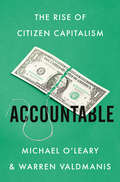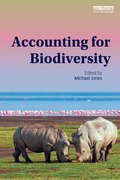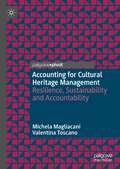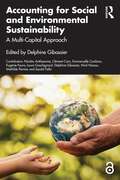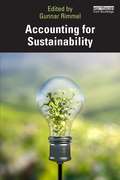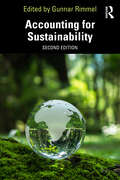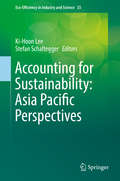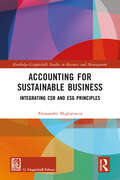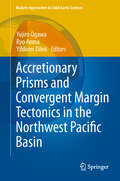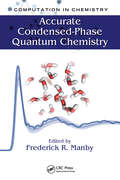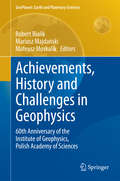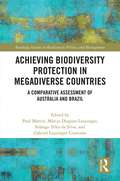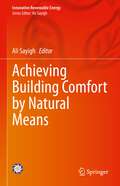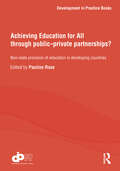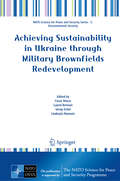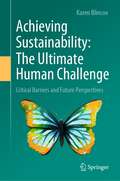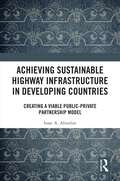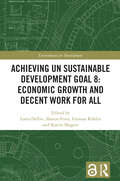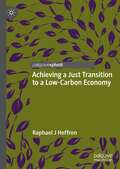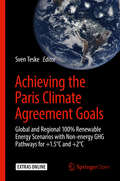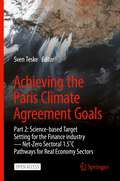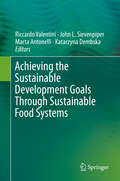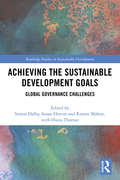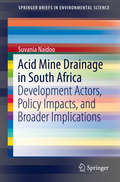- Table View
- List View
Accountable: The Rise of Citizen Capitalism
by Michael O'Leary Warren Valdmanis“More than ever before, this is the book our economy needs.” – Dr. Rajiv Shah, president of the Rockefeller Foundation“Unwilling to settle for easy answers or superficial changes, O’Leary and Valdmanis push us all to ask more of our economic system.” – Senator Michael F. BennetThis provocative book takes us inside the fight to save capitalism from itself.Corporations are broken, reflecting no purpose deeper than profit. But the tools we are relying on to fix them—corporate social responsibility, divestment, impact investing, and government control—risk making our problems worse.With lively storytelling and careful analysis, O’Leary and Valdmanis cut through the tired dogma of current economic thinking to reveal a hopeful truth: If we can make our corporations accountable to a deeper purpose, we can make capitalism both prosperous and good.What happens when the sustainability-driven CEO of Unilever takes on the efficiency-obsessed Warren Buffett? Does Kellogg’s—a company founded to serve a healthy breakfast—have a sacred duty to sell sugary cereal if that’s what maximizes profit? For decades, government has tried to curb CEO pay but failed. Why? Can Harvard students force the university to divest from oil and gas? Does it even matter if they do?O’Leary and Valdmanis, two iconoclastic investors, take us on a fast-paced insider’s journey that will change the way we look at corporations. Likely to spark controversy among cynics and dreamers alike, this book is essential reading for anyone with a stake in reforming capitalism—which means all of us.
Accounting for Biodiversity: Accounting For Biodiversity
by Michael Jones‘Biodiversity’ at its simplest, refers to the variety of species inhabiting Planet Earth. It is essential to the well-being of the planet. There is now a scientific consensus around the current ongoing crisis in biodiversity arising from both climate change and human activities. Experts believe we are in the middle of a mass extinction of biodiversity with devastating consequences for our planet. Accounting for Biodiversity explores the need for companies to actively protect, conserve and improve biodiversity within their sphere of operation. The 14 chapters written by a selected team of experts investigate the ways in which companies are embracing their responsibility through a variety of biodiversity initiatives and innovative models designed to improve the recording, reporting and valuing of biodiversity. Global case studies look at biodiversity accounting in Africa, Asia, Australasia, Europe and South America. Overall, this book provides a comprehensive set of reflections on accounting for biodiversity and recommendations for the future. This book is essential reading for all those interested in the contribution that accounting can make to the preservation of biodiversity. As we see increasing awareness of the importance of sustainability and ecological responsibility in business activity it is relevant and should prove informative to students, managers, accountants and those in business more generally. It is also important for all those interested in conserving biodiversity.
Accounting for Carbon
by Bellassen, Valentin and Stephan, Nicolas Valentin Bellassen Nicolas StephanThe ability to accurately monitor, record, report and verify greenhouse gas emissions is the cornerstone of any effective policy to mitigate climate change. Accounting for Carbon provides the first authoritative overview of the monitoring, reporting and verification (MRV) of emissions from the industrial site, project and company level to the regional and national level. It describes the MRV procedures in place in more than fifteen of the most important policy frameworks - such as emissions trading systems in Europe, Australia, California and China, and the United Nations Framework Convention on Climate Change - and compares them along key criteria such as scope, cost, uncertainty and flexibility. This book draws on the work of engineers and economists to provide a practical guide to help government and non-governmental policy makers and key stakeholders in industry to better understand different MRV requirements, the key trade-offs faced by regulators and the choices made by up-and-running carbon pricing initiatives.
Accounting for Cultural Heritage Management: Resilience, Sustainability and Accountability
by Michela Magliacani Valentina ToscanoThe transformative role of culture, its ability to create value for the benefit of current and future generations, is widely recognized by academics of many disciplines, professionals and policymakers. Notwithstanding, how culture can be a driving force for economic growth, a source of welfare and tools for social inclusion, still deserves to be investigated at various levels, starting with local communities. This book attempts to explain the relevance of accounting knowledge for managing cultural heritage by sustainable, resilient, accountable organizations, regardless of their public or private institutional form. This book aims at understanding the role of cultural heritage in the economy, in society and in facing the new challenges deriving from the enactment of the UN Sustainable Development agenda, as well as the pandemic emergency from COVID-19. It adopts a managerial accounting studies approach to provide answers that can be applied in any organizational context. The results achieved from the field research are critically discussed under the theoretical frameworks referring to the theory of value and its creation. From the findings and their discussion, a conceptual model based on empiricism is proposed for managing cultural heritage of communities under sustainable perspective, even in times of crisis. It will be essential reading for academics and students of cultural heritage management, sustainability and crisis management in organisations.
Accounting for Social and Environmental Sustainability: A Multi-Capital Approach (Routledge Studies in Accounting)
by Delphine GibassierFor a company, managing its social and environmental performance is no longer just a matter of reducing its impact; it must also be able to assess its contribution to resolving or aggravating social and environmental problems. This book argues that the current work on accounting for sustainability has not yet given organisations a tool to integrate their performance within the planetary and social framework that conveys actual "planetary and social budgets", and that business organisations lack the possibility to go beyond incremental performance measurement.It offers an in‑depth examination of multi‑capital accounting, which has already been integrated within the Corporate Sustainability Reporting Directive and will follow on from sustainability reporting. The LIFTS model (Limits and Foundations Towards Sustainability Accounting Model) used in this book combines various scientific and practical contributions to develop budgets for environmental impacts and social obligations on an organisational scale. It proposes an accounting mechanism that enables an organization to manage each of its budgets and measure variances between forecast and actual. It provides an introduction to the principles of this model and its conditions of application and describes its implementation in numerous companies.While the main audience for the book is academics, advanced students and researchers in accounting for sustainability, business and management and economics, it will also appeal to practitioners, policymakers, national standard setters, think tanks and non-governmental organizations (NGOs).
Accounting for Sustainability
by Gunnar RimmelThis book provides a broad overview of how sustainability reporting has grown, how it is used now and where it is heading. Daily, we read and hear in various media about concepts such as corporate social responsibility (CSR), sustainability reporting, sustainability accounting, environmental reports, corporate citizenship or environmental management systems. Accounting for Sustainability decodes this terminology by providing an accessible introduction to the topic that explores sustainability reporting from an internal and external perspective. It begins with an overview of how sustainability reporting has emerged and why it is important, before moving on to cover definitions of key terms and specific theories and frameworks. Subsequent chapters explore the role of financial management, sustainability standards, accounting communication and capital markets. With learning outcomes and study questions embedded in each chapter, this book will be of great interest to students of sustainability reporting and accounting, as well as practitioners taking related professional accreditations.
Accounting for Sustainability
by Gunnar RimmelThis book provides a broad overview of how sustainability reporting has grown, how it is used now, and where it is heading.Daily, we encounter concepts such as corporate social responsibility (CSR); sustainability reporting; sustainability accounting; environmental reports; corporate citizenship or environmental management systems; or Environmental, Social and Governance (ESG) disclosures. Accounting for Sustainability decodes this terminology by offering an accessible introduction that explores sustainability reporting from both internal and external perspectives. It begins with an overview of key terms and theories, followed by chapters on financial management, sustainability standards, accounting communication, and capital markets. This new edition has been fully revised and expanded with four new chapters, including coverage of the EU’s Corporate Sustainability Reporting Directive (CSRD), European Sustainability Reporting Standards (ESRS), and the global efforts of the International Sustainability Standards Board (ISSB). It also includes critical reflections on digitalisation, standard-setting, and assurance.With learning outcomes and study questions embedded in each chapter, this book will be of great interest to students of sustainability reporting and accounting, as well as practitioners taking related professional accreditations.
Accounting for Sustainability: Asia Pacific Perspectives (Eco-Efficiency in Industry and Science #33)
by Ki-Hoon Lee Stefan SchalteggerThis book advances the understanding of corporate sustainability and challenges and roles of sustainability accounting in the Asia-Pacific region. The Asia-Pacific region has shown fast economic growth for several decades which is expected to continue. In this context, Asia has become the "production engine" of the global economy. At the same time scientific reports reveal that some planetary boundaries are crossed, for example relating to biodiversity and climate change. Companies in the Asia-Pacific region are therefore increasingly challenged to reduce their environmental impacts, to document their social contribution and to contribute to sustainable development. Key approaches to identify sustainability problems and challenges, to support improvement processes and to back up sustainability contributions include accounting and reporting. In contrast to the high relevance of accounting and reporting for corporate sustainability for the Asia-Pacific region, academic research has so far been dominated by Western researchers and pre-dominantly dealt with Western and Japanese cases and approaches. It is thus time to take account of Asian perspectives on accounting and reporting for sustainability in the Asia-Pacific region.
Accounting for Sustainable Business: Integrating CSR and ESG Principles (Routledge-Giappichelli Studies in Business and Management)
by Alessandro MigliavaccaThe role of firms, corporations, and businesses in shaping social outcomes has long been a key area of focus for economics and business scholars. With growing attention on addressing climate change, reducing social inequalities, and upholding human rights, there is an increasing interest in how corporate activities impact society. This book examines these pressing issues through the lens of fundamental theories of the firm, particularly drawing on the Italian tradition of Economia Aziendale, which views the firm as a vehicle for meeting human needs and generating social value.The book begins by introducing the anthropocentric theory of the firm and explores the connection between accounting practices and sustainable management. It offers a thorough review of the literature on Corporate Social Responsibility (CSR) and Environmental, Social, and Governance (ESG) practices, highlighting key aspects of the extensive body of work in this field. The analysis is grounded in the context of evolving regulations, especially within the EU, that underscore the importance of considering both financial and sustainability factors. Rational management theory is expanded to include sustainability accounting, showcasing its pivotal role in corporate decision-making. The book provides detailed guidance on the integrated knowledge acquisition process, showing how companies can systematically identify and assess their social and environmental impacts. This process is further illustrated through a hypothetical reality-based case study, demonstrating its application in a practical context. The book concludes with an exploration of current trends and future directions in sustainability accounting.It serves as a valuable resource for academics, practitioners, and anyone interested in the intersection of corporate governance, accounting, and sustainability.
Accretionary Prisms and Convergent Margin Tectonics in the Northwest Pacific Basin (Modern Approaches in Solid Earth Sciences #8)
by Ryo Anma Yildirim Dilek Yujiro OgawaAccretionary prisms in convergent margins are natural laboratories for exploring initial orogenic processes and mountain building episodes. They are also an important component of continental growth both vertically and laterally. Accretionary prisms are seismically highly active and their internal deformation via megathrusting and out-of-sequence faulting are a big concern for earthquake and tsunami damage in many coastal cities around the Pacific Rim. The geometries and structures of modern accretionary prisms have been well imaged seismically and through deep drilling projects of the Ocean Drilling Program (and recently IODP) during the last 15 years. Better understanding of the spatial distribution and temporal progression of accretionary prism deformation, structural and hydrologic evolution of the décollement zone (tectonic interface between the subducting slab and the upper plate), chemical gradients and fluid flow paths within accretionary prisms, contrasting stratigraphic and deformational framework along-strike in accretionary prisms, and the distribution and ecosystems of biological communities in accretionary prism settings is most important in interpreting the evolution of ancient complex sedimentary terrains and orogenic belts in terms of subduction-related processes. This book is a collection of interdisciplinary papers documenting the geological, geophysical, geochemical, and paleontological features of modern accretionay prisms and trenches in the northwestern Pacific Ocean, based on many submersible dive cruises, ODP drilling projects, and geophysical surveys during the last 10 years. It also includes several papers presenting the results of systematic integrated studies of recent to ancient on-land accretionary prisms in comparison to modern analogues. The individual chapters are data and image rich, providing a major resource of information and knowledge from these critical components of convergent margins for researchers, faculty members, and graduate and undergraduate students. As such, the book will be a major and unique contribution in the broad fields of global tectonics, geodynamics, marine geology and geophysics, and structural geology and sedimentology.
Accurate Condensed-Phase Quantum Chemistry (Computation in Chemistry)
by Frederick R. ManbyThe theoretical methods of quantum chemistry have matured to the point that accurate predictions can be made and experiments can be understood for a wide range of important gas-phase phenomena. A large part of this success can be attributed to the maturation of hierarchies of approximation, which allow one to approach very high accuracy, provided t
Achievements, History and Challenges in Geophysics: 60th Anniversary of the Institute of Geophysics, Polish Academy of Sciences (GeoPlanet: Earth and Planetary Sciences)
by Robert Bialik Mariusz Majdański Mateusz MoskalikOver the last six decades, the field of geophysics has experienced rapid development. Seismic methods, magnetic studies, hydrology and atmospheric sciences have expanded thanks to a boom in the computer sciences and measurement techniques. The frontiers of geophysics have also expanded, now including research on the polar areas, both Arctic and Antarctic. All these events are clearly reflected in the 60-year-long history of the Institute of Geophysics, Polish Academy of Sciences. This volume describes the most prominent achievements, the history of research and also the future potential of the Institute of Geophysics PAS. It describes measurements in various projects, methods of interpreting scientific data, and last but not least the people who have driven this research in many scientific projects.
Achieving Biodiversity Protection in Megadiverse Countries: A Comparative Assessment of Australia and Brazil (Routledge Studies in Biodiversity Politics and Management)
by Paul Martin Márcia Dieguez Leuzinger Solange Teles da Silva Gabriel Leunziger CoutinhoThis volume systematically analyses why legal doctrines for the protection of biodiversity are not sufficiently effective. It examples implementation in Australia and Brazil, two megadiverse countries with very differing legal and cultural traditions and natural environments. Substantial effort goes into the development and interpretation of legal doctrines for the protection of biodiversity in national and international law. Despite this, biodiversity continues in steep decline. Nowhere is this more evident than in megadiverse countries, such as Australia and Brazil, which possess the greatest number and diversity of animals and plants on Earth. The book covers a wide range of topics, including farming, mining, marine environments, indigenous interests and governance. Achieving Biodiversity Protection in Megadiverse Countries highlights specific causes of underperformance in protecting diverse terrestrial and marine environments. It provides proposals for more effective implementation in these two jurisdictions, relevant to other megadiverse territories, and for biodiversity protection generally. Each chapter was written by teams of Australian and Brazilian authors, so that similar issues are considered across both jurisdictions, to provide both country-specific and generalisable insights. Achieving Biodiversity Protection in Megadiverse Countries will be of great interest to students and scholars of environmental law and governance and biodiversity conservation, as well as policymakers, practitioners and NGOs working in these fields.
Achieving Building Comfort by Natural Means (Innovative Renewable Energy)
by Ali SayighAchieving Building Comfort by Natural Means explores examples of green building designs and methods that are currently being used around the world to achieve human comfort in buildings. The operation of buildings accounts for more than 40% of total energy use and is a major source of carbon emissions. It is imperative that this consumption be substantially decreased and that energy needed for building comfort is obtained from renewable and environmentally friendly sources. This book brings together a global group of contributors who look at factors such as location, climate, building materials, energy management, ventilation, thermal environmental conditions, shading, lighting, acoustics, and more that are critical for achieving buildings that are more sustainable.Thermal comfort and climatic potential of ventilative cooling in Italian climates is available open access under a Creative Commons Attribution 4.0 International License via link.springer.com.
Achieving Education for All through Public–Private Partnerships?: Non-State Provision of Education in Developing Countries (Development in Practice Books)
by Pauline RoseConcern for achieving Millennium Development Goals (MDGs) by 2015 has led to a focus on the role that non-state providers (NSPs) can offer in extending access and improving quality of basic services. While NSPs can help to fill a gap in provision to those excluded from state provision, recent growth in both for-profit and not-for-profit providers in developing countries has sometimes resulted in fragmentation of service delivery. To address this, attention is increasingly given in the education sector to developing ‘partnerships’ between governments and NSPs. Partnerships are further driven by the expectation that the state has the moral, social, and legal responsibility for overall education service delivery and so should play a role in facilitating and regulating NSPs.Even where the ultimate aim of both non-state providers and the state is to provide education of acceptable quality to all children, this book provides evidence from diverse contexts across Africa, South Asia, and Latin America to highlight the challenges in them partnering to achieve this. This book was published as a special issue of Development in Practice.
Achieving Sustainability in Ukraine through Military Brownfields Redevelopment (NATO Science for Peace and Security Series C: Environmental Security)
by Cezar Morar Laurel Berman Serap Erdal Liudmyla NiemetsThis book is written by international experts who are brownfields practitioners from over 15 countries. Blighted and contaminated properties, including military, industrial, commercial, and multi-residential properties, globally referred to as “brownfields,” are a shared phenomenon among NATO and NATO-partner countries. They provide practical solutions to addressing, evaluating, and cleaning up brownfields, including multiple case studies. Topics include reuse of military brownfields, sustainable site reuse, community engagement, risk assessment, impacts of the war in Ukraine related to military brownfields development and redevelopment, a free training to improve capacity to evaluate environmental and health risks of brownfields, and shared best practices.
Achieving Sustainability: Critical Barriers and Future Perspectives
by Karen BlincoeThe book provides an assessment of whether sustainability is realizable in the current societal framework. What are the challenges and the barriers - and what are the levers necessary to meet and overcome them?Through a revision of the essence of sustainability the book provides an opportunity to understand the deeper level of the radical change that sustainability represents, and the resistance that is preventing its realization.To build the argument the sustainable development model is compared with current development theories as well as alternative solutions based on utopian models of the past. The book assesses the results that can be achieved within the current systemic framework, based on case stories. It outlines the limitations to sustainability, pointing out and defining the multiple, cross-sectoral and systemic barriers that hinder the transition.Finally, the book offers perspectives on achieving a sustainable future, encompassing the impacts from recent events including the pandemic as well as the multiple mitigation and transition initiatives undertaken globally.Brian Goodwin's QuoteLike the caterpillar that wraps itself up in its silken swaddling bands prior to its metamorphosis into a butterfly, we have wrapped ourselves in a tangled skin from which we can emerge only by going through a similarly dramatic transformation.
Achieving Sustainable Highway Infrastructure in Developing Countries: Creating a Viable Public-Private Partnership Model
by Isaac AbiodunThis book investigates the challenges being experienced in the traditional procurement methods for road infrastructure in developing countries and explores the features of Public Private Partnerships (PPP) as an alternative procurement method with the potential of achieving a more sustainable highway network in Nigeria and other developing countries of Africa.The book starts with an investigation into the challenges of traditional Design Bid Build (DBB) procurement methods before examining the features of PPP and its potentials as an alternative procurement method for highway development, operation and maintenance, including developing and validating a PPP framework and model for application in the sustainable development and construction of highways. The PPP model developed from the study is expected to enhance decision making in the choice between the DBB and PPP methods during project planning and procurement stages. The author has developed a simple framework, illustrated in a single pictorial display the interconnected relationships, the performances of both the procurement methods, and the possible enhancement of the DBB method and the implementation procedure of the PPP method for sustainable highway infrastructure in developing countries.The framework developed and explained in this book will be of benefit to infrastructure leaders and policy makers, regulators, operators, maintenance agencies and contractors in developing countries and researchers and academics studying infrastructure procurement and delivery methods.
Achieving UN Sustainable Development Goal 8: Economic Growth and Decent Work For All (Environment for Development)
by Gunnar Köhlin Lotta Dellve Sharon Fonn Katrin SkagertThis book brings together knowledge on how to achieve the UN Sustainable Development Goal 8, to bring societal change through sustainable economic growth and decent work for all by 2030.At its core is the great challenge of achieving economic growth without compromising the environment, while ensuring respect for fundamental human rights, and in particular the right to employment with equal and safe work conditions. This book provides a critical analysis of Sustainable Development Goal (SDG) 8 in the 2030 Agenda, its targets and indicators, to reveal biases, tensions and contradictions that need to be addressed to achieve this goal and to guide policymaking. The role and potential of academia to contribute to achieving this SDG is scrutinized. Chapters examine and assess specific targets for SDG 8, which includes policies, resource efficiency, youth employment, child labour and sustainable tourism. Higher education institutions’ tools for capacity building are presented, examining how education and academic research can play a role in achieving the SDG 8 targets. Overall, this book offers a synthesis of how research and higher education can make a difference in achieving a complex SDG.This book will be of great interest to academics and professionals working on the United Nations Sustainable Development Goals and can be used as a policymaking guide for 2030 and beyond.
Achieving a Just Transition to a Low-Carbon Economy
by Raphael J HeffronThe ambition of most countries across the world is to develop a low-carbon economy, evidenced by the fact that the vast majority of countries have signed the Paris COP21 agreement. This book contends that this global societal transition to a low-carbon economy must be just. As such, it will be an invaluable and accessible reference for scholars from all research disciplines who aim in their research to see a fairer, more equitable and inclusive world where sustainability is at the fore and climate targets are achieved.This is the first in-depth and original analysis to explore the central importance of law in achieving a just transition to a low-carbon economy. In addition, it advances the JUST framework, a unique framework for assessing the just transition. This important research and theoretical tool provides a practical perspective as it ensures the geographical space and timelines of development are factored into analysis. The research also provides analysis on the just transition movement around the world and the influence of international institutions.Through several case studies on Just Transition Commissions and Critical Mineral Development, the book details and demonstrates key elements of justice, including distributive, procedural, restorative, recognition, and cosmopolitan justice. It is clear from the analysis that while these are vast areas for analysis, if applied in practice, they all centrally contribute to ensuring society will advance in achieving a just transition to a low-carbon economy.
Achieving the Paris Climate Agreement Goals: Global and Regional 100% Renewable Energy Scenarios with Non-energy GHG Pathways for +1.5°C and +2°C
by Sven Teske<p>This open access book presents detailed pathways to achieve 100% renewable energy by 2050, globally and across ten geographical regions. Based on state-of-the-art scenario modelling, it provides the vital missing link between renewable energy targets and the measures needed to achieve them. Bringing together the latest research in climate science, renewable energy technology, employment and resource impacts, the book breaks new ground by covering all the elements essential to achieving the ambitious climate mitigation targets set out in the Paris Climate Agreement. For example, sectoral implementation pathways, with special emphasis on differences between developed and developing countries and regional conditions, provide tools to implement the scenarios globally and domestically. Non-energy greenhouse gas mitigation scenarios define a sustainable pathway for land-use change and the agricultural sector. Furthermore, results of the impact of the scenarios on employment and mineral and resource requirements provide vital insight on economic and resource management implications. <p>The book clearly demonstrates that the goals of the Paris Agreement are achievable and feasible with current technology and are beneficial in economic and employment terms. It is essential reading for anyone with responsibility for implementing renewable energy or climate targets internationally or domestically, including climate policy negotiators, policy-makers at all levels of government, businesses with renewable energy commitments, researchers and the renewable energy industry.</p>
Achieving the Paris Climate Agreement Goals: Part 2: Science-based Target Setting for the Finance industry — Net-Zero Sectoral 1.5˚C Pathways for Real Economy Sectors
by Sven TeskeThis open access book is designed as a continuation of the editor’s 2019 book Achieving the Paris Climate Agreement Goals. This volume provides an in-depth analysis of industry sectors globally, and its purpose is to present emission reduction targets in 5-year steps (2025 to 2050) for the main twelve finance sectors per the Global Industry Classification System. This scientific analysis aims to support the United Nations Principles for Responsible Investment initiative to give sustainability guidance for the global finance industry. The industry sector pathways presented here are based on the latest global and regional 100% renewable energy and non-energy greenhouse gas Representative Concentration Pathways in order to keep climate change significantly under +1.5 C and thereby achieve the Paris Climate Agreement goals. The heart of this book is three chapters presenting the results of industry scenario modelling. These chapters cover twelve industry and service sectors as well as transportation and buildings. The specific energy demand and specific emissions are presented based on the emission accounting concept of “Scope 1, Scope 2 and Scope 3” emission pathways. This methodology has been developed to measure the climate and sustainability index for companies, and this research project expands the methodology to apply it to entire industry sectors. The results presented here are the first overall industry assessments under Scope 1, 2 and 3 from 2020 through 2050. The base for the energy pathways is the scenarios scenarios published in the previous volume. The nonenergy GHG emission scenarios, broken down to agriculture & forestry and industry, are detailed and include all major greenhouse gases and aerosols. The final section of the book presents the main conclusions of the industry pathway development work and recommendations for the finance industry and policy makers. Additionally, future qualitative future investment requirements in specific technologies and measures are presented.
Achieving the Sustainable Development Goals Through Sustainable Food Systems (Food And Health Ser.)
by Marta Antonelli Riccardo Valentini John L. Sievenpiper Katarzyna DembskaThis publication offers a systemic analysis of sustainability in the food system, taking as its framework the Sustainable Development Goals of the 2030 Agenda of the United Nations. Targeted chapters from experts in the field cover main challenges in the food system and propose methods for achieving long term sustainability. Authors focus on how sustainability can be achieved along the whole food chain and in different contexts. Timely issues such as food security, climate change and migration and sustainable agriculture are discussed in depth. The volume is unique in its multidisciplinary and multi-stakeholder approach. Chapter authors come from a variety of backgrounds, and authors include academic professors, members of CSO and other international organizations, and policy makers. This plurality allows for a nuanced analysis of sustainability goals and practices from a variety of perspectives, making the book useful to a wide range of readers working in different areas related to sustainability and food production. The book is targeted towards the academic community and practitioners in the policy, international cooperation, nutrition, geography, and social sciences fields. Professors teaching in nutrition, food technology, food sociology, geography, global economics, food systems, agriculture and agronomy, and political science and international cooperation may find this to be a useful supplemental text in their courses.
Achieving the Sustainable Development Goals: Global Governance Challenges (Routledge Studies in Sustainable Development)
by Susan Horton Simon Dalby Rianne Mahon Diana ThomazThis book draws on the expertise of faculty and colleagues at the Balsillie School of International Affairs to both locate the Sustainable Development Goals (SDGs) as a contribution to the development of global government and to examine the political-institutional and financial challenges posed by the SDGs. The contributors are experts in global governance issues in a broad variety of fields ranging from health, food systems, social policy, migration and climate change. An introductory chapter sets out the broad context of the governance challenges involved, and how individual chapters contribute to the analysis. The book begins by focusing on individual SDGs, examining briefly the background to the particular goal and evaluating the opportunities and challenges (particularly governance challenges) in achieving the goal, as well as discussing how this goal relates to other SDGs. The book goes on to address the broader issues of achieving the set of goals overall, examining the novel financing mechanisms required for an enterprise of this nature, the trade-offs involved (particularly between the urgent climate agenda and the social/economic goals), the institutional arrangements designed to enable the achievement of the goals and offering a critical perspective on the enterprise as a whole. Achieving the Sustainable Development Goals makes a distinctive contribution by covering a broad range of individual goals with contributions from experts on governance in the global climate, social and economic areas as well as providing assessments of the overall project – its financial feasibility, institutional requisites, and its failures to tackle certain problems at the core. This book will be of great interest to scholars and students of international affairs, development studies and sustainable development, as well as those engaged in policymaking nationally, internationally and those working in NGOs.
Acid Mine Drainage in South Africa: Development Actors, Policy Impacts, and Broader Implications (SpringerBriefs in Environmental Science)
by Suvania NaidooThis SpringerBrief focuses on Acid Mine Drainage (AMD) in the three basins in the Witwatersrand, South Africa. It provides a background to AMD and its impactsfrom a social science perspective. The South African government and non-governmental organizations' response to AMD is assessed, as well the socio-economic and developmental effects of AMD. This volume, which is based on the author's Master's dissertation at UNISA, involves interviews with a range of experts in the field from government departments, environmental organisations (activists), the private sector (mining), tourism sector and the agricultural sector. The book discusses existing policy documents on AMD and provides recommendations in response to the many socio-economic impacts which have not been fully addressed. A literature review on the global context of AMD is provided. South Africa's water systems are already severely harmed by climate change, different forms of pollution, and poorly managed sanitation systems. For these reasons, the country is becoming increasingly water-stressed and therefore, water will continue to become much scarcer in the future. As a result of AMD's continued impact on South Africa's water systems, as a technical or scientific matter as well as the policy implications for the mining sector, water security and socio-economic sustainability has become a highly contested issue.
